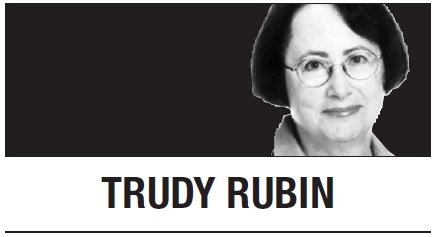[Trudy Rubin] Hold the Nobel -- Korea talks a long haul
By Korea HeraldPublished : May 13, 2018 - 18:07
 In 1986, I crossed into North Korea for a couple of bizarre hours. That visit came to mind when US President Donald Trump announced last week that he will meet North Korean leader Kim Jong-un on June 12 in Singapore.
In 1986, I crossed into North Korea for a couple of bizarre hours. That visit came to mind when US President Donald Trump announced last week that he will meet North Korean leader Kim Jong-un on June 12 in Singapore.My memories offer a blunt reminder of the Kim dynasty’s long history of erratic behavior which should temper any overwrought expectations for the upcoming summit.
So hold the Nobel! A glance at past North Korean behavior patterns should temper Trump’s expectations. Forewarned should be (but may not be) forearmed.
In the 1980s, South Korean and Western journalists were allowed once a year to cross the demarcation line from the South Korean side of the Demilitarized Zone to the North, through the building where the 1953 truce was signed. (There still is no official peace treaty.) Penned into a plaza rimmed by North Korean guards, we were confronted by a phalanx of North Korean men wearing Kim Il-sung buttons who screamed at us the entire time.
By 1992, the standoff at the DMZ was less hostile: that year the two Koreas signed a declaration pledging to denuclearize the Korean peninsula. In 1994, North Korea pledged, in a framework accord with the United States, to eliminate its nuclear weapons. Both promises were abandoned.
By my next visit to the DMZ in 2005, the area was flooded with buses full of South Korean tourists. Later that year, in six-party talks, including China, Russia, the United States, Japan, and South Korea, Pyongyang committed to abandoning all nuclear weapons and nuclear programs. Didn’t happen.
In other words, there’s nothing new about North Korean talk of denuclearization -- or the release of the three US prisoners held in Pyongyang (spare a thought for US student/prisoner Otto Warmbier, who was returned in a coma and died). Suffice it to say, North Korea is now believed to have at least 60 nuclear weapons, with intercontinental ballistic missiles that can reach the US mainland.
Kim believes his bomb and missile tests have propelled North Korea into the ranks of nuclear states. None of the Korea experts I’ve interviewed think Kim will give up all his nuclear weapons. They say the word “denuclearization” means something very different to Kim and to Trump.
Trump’s national security adviser John Bolton recently said, when it comes to denuclearization of North Korea, “We have very much in mind the Libya model.” Libyan leader Moammar Gadhafi agreed to surrender his nascent program which was closed down over three months in 2004.
But talk of a “Libyan model” is sophistry. Libya’s program was small, and it had no nukes. More to the point, having surrendered his nuclear program, Gadhafi was overthrown, with US and NATO involvement, in 2011.
The Kims built their program to ensure that the United States would never overthrow them. Moreover, Trump’s willingness to junk previously agreed accords -- including the Iran nuclear deal -- make denuclearization even less likely.
“The deal they talk about the most is not Libya,” says Michael Green, national security adviser on Asia to George W. Bush and now a vice president at the Center for Strategic and International Studies. “It’s Nixon and Mao -- that’s the deal they talk about. Nixon let China keep its nuclear weapons and didn’t pressure them on human rights. What Kim really wants is for the United States to treat him as a nuclear weapons state.”
As for the White House demand that North Korea agree to “complete, verifiable and irreversible denuclearization” (referred to as CVID) -- Green says “that is not something Kim has any intention of doing.”
It’s more likely, many North Korea experts believe, that Kim will push for a joint statement on peace and denuclearization that will require years of negotiations. Given North Korea’s extensive and hidden nuclear program, complete verification may be impossible to achieve.
Meantime, Kim has already milked huge benefits from Trump’s agreement to meet him which gives him recognition as a major global player. Kim’s father sought meetings with US presidents Clinton and Bush but never got them.
The North Korean leader will no doubt try to profit from South Korea’s eagerness to banish the war talk that flared between Kim and Trump. He will also try to benefit from Trump’s talk of bringing peace to the Koreas. He may propose some kind of peace plan (less than a treaty) between North and South Korea that doesn’t require denuclearization. Such a plan would shield Pyongyang from future US military threats.
Kim will be playing the optics of the summit with a skill that matches or outdoes Trump’s theatrics and with a clarity about what he wants and what he will pay for it.
The good news is that superficial talks are better than another war in Asia. The bad news: If Trump falls for his own hype he may be outwitted by a showman who can best him at this game.
Trudy Rubin
Trudy Rubin is a columnist and editorial board member for the Philadelphia Inquirer. -- Ed.
(Tribune Content Agency)
-
Articles by Korea Herald





![[Herald Interview] 'Amid aging population, Korea to invite more young professionals from overseas'](http://res.heraldm.com/phpwas/restmb_idxmake.php?idx=644&simg=/content/image/2024/04/24/20240424050844_0.jpg&u=20240424200058)












![[KH Explains] Korean shipbuilding stocks rally: Real growth or bubble?](http://res.heraldm.com/phpwas/restmb_idxmake.php?idx=652&simg=/content/image/2024/04/25/20240425050656_0.jpg&u=)

